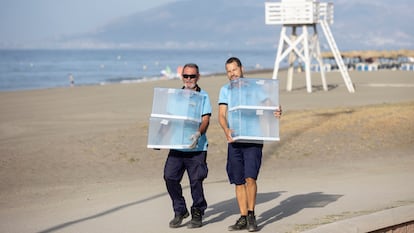Spain votes with vertigo
The right is tipped to win, but the race opened up in the final stretch. The thought that the far right might enter the government has mobilized the left. The four major parties are not only fighting for power, but also for their political projects

If elections are a state of mind, this Sunday’s elections in Spain feel very much like vertigo. The right is going to the ballot convinced of the victory that almost all opinion polls were giving it until five days ago, but the spark of a comeback that the left managed to ignite in the last week has demolished any certainty and opened up a range of possibilities.
Both the Socialist Party (PSOE) and Sumar succeeded in instilling in the electorate the idea that a new version of the 1993 maracanazo (victory for the underdog) is still possible. That was the election when former Socialist prime minister Felipe González, despite trailing in the polls, pulled off a successful second televised debate and a brilliant end of the campaign, then went on to snatch victory by 300,000 votes from the conservative José María Aznar, who believed the prime minister’s job was already his. Adrián Barbón, the premier of Asturias, one of the few regions where the Spanish left held on to power in the May 28 regional elections, revived the idea of the 1993 phenomenon at the close of the campaign on Friday.
On the right, however, the right-wing Popular Party (PP) privately admits that there have been stumbles this last week of campaigning, but they do not see any possible turnaround and are confident of a comfortable victory that will shatter what they consider to be wishful thinking by the left. During the past week, they encouraged the idea of an overwhelming majority bordering on 170 seats, which would allow them to govern alone, but they have gradually lowered their expectations. Now they assume that they will most likely have to govern in coalition with the small, far-right Vox, although PP leader Alberto Núñez Feijóo has spent the campaign trying to reduce his party’s potential reliance on Vox, so as not to have to give them too many or very important ministerial portfolios.
The idea that Vox could enter the central government and that its leader, Santiago Abascal, could become the deputy prime minister of Spain seems to have mobilized the left at the last minute, and even more so after seeing Abascal’s more extreme positions at Wednesday’s three-way televised debate. Feijóo’s mistakes over the last week also seem to have had a mobilizing effect on progressive voters.
Sumar, a new movement of 15 small left-wing parties, and the PSOE are upbeat about the outcome of the most recent three-way debate, which the Socialists saw as a second chance after the fiasco of the face-to-face debate on July 10. Politicians on the left they are convinced that Feijóo made a terrible mistake by not participating in the debate.
The debate also served to boost Sumar thanks to the success of its leader Yolanda Díaz, who currently serves as a second deputy PM and labor minister, and thus to encourage the progressives. In the final stretch, the PSOE and Sumar, rather than confronting each other, showed a consensus that leads their followers to dream of a new left-wing coalition, but without all the internal tension that has done so much damage in the current political term.
Various polls conducted in the last days of the campaign say very different things, from those that give an overwhelming majority to the right to those that says there is still a way to go, and that the blocs are evenly matched. These unknowns are keeping the millions of Spaniards who will vote this Sunday — and the record 2.47 million who have voted by mail — on tenterhooks. On the left, there is much more optimism in the air than there was two weeks ago.
The polls have practically all of the Spanish political class holding their breath. More than at any time in the past, tonight’s result puts the political projects of the four major parties at stake and may also have important repercussions in the battles with nationalists in Catalonia and the Basque Country.
In addition to the government, its political orientation, and the possibility of Spain joining the few countries in the world with the far right in power — something that would break the left-right balance in Europe — the future of the PP, the PSOE, Sumar, and Vox is also at stake this Sunday.

Feijóo is a strong leader in the PP: he has managed to unify the party and has secured the support of both former PMs Mariano Rajoy and José María Aznar, who were always very much at odds within the two souls of the PP; he has also brought back more extreme characters such as Cayetana Álvarez de Toledo in a bid to court the vote of the party’s hard wing that is closer to Vox. If he succeeds in governing, as most polls suggested last week, it will be the climax of a career full of electoral successes in his home region of Galicia. However, if he does not win the elections he has already said that he will give up the party leadership. It is unclear what would happen if he wins the election but fails to form a government, a scenario he himself has raised as a possibility throughout the campaign.
The future of the PP is at stake if Feijóo falls short of the enormous expectations he has generated, encouraging the idea of a landslide victory that would even allow him to govern alone. At the end of the campaign, the PP leader changed his story and in one of his last rallies he showed his discomfort at the possibility of not reaching a majority: “Either we sweep them away, or they will try to govern even after losing.” He even maintained the idea that the election “is rigged” because it is not enough for the PP to win the elections, it has to join forces with Vox, or all the other political forces will unite against it.
The Swedish example
That is exactly what happened to the PSOE in the regions of Madrid, Castilla y León and Murcia in 2019, and again two weeks ago in Extremadura and in the Canary Islands, where the Socialists are not in power despite having won, because the PP allied itself with other smaller parties — Vox and Coalición Canaria.
However, Feijóo insists on ignoring this because he apparently feels that there should be different rules for the central government and for the regional governments, although the Constitution establishes that the prime minister is appointed by the Congress of Deputies by absolute majority, and despite the fact that in all European and world parliamentary systems, whoever has the most support gets to govern.
Feijóo has repeatedly cited the example of Sweden, a country whose prime minister is neither a member of the first nor the second most-voted party, but the third one. This came about because of an alliance between the third party with the one that came in second, which is a far-right party, in order to unseat the party that came first, the Social Democrats.
The party whose political future is most at stake, in any case, is the PSOE, and above all its leader Pedro Sánchez. This Sunday he faces the riskiest of all his bets. The incumbent prime minister decided to bring forward the elections after the debacle of his party in the municipal and regional elections of May 28, where the PSOE lost power almost in every part of Spain, although not so many votes. On Sunday he will find out whether with that decision to call a snap election he has also brought forward the end of his political career, or whether has written the umpteenth epic chapter in his memoir, Manual de Resistencia (Resistance Handbook).

A bad result for the PSOE or a landslide victory of the right would most likely fire the starting pistol on a leadership race in the century-old party that has governed Spain for 29 years out of the 41 that have elapsed since 1982, when Felipe González first arrived at La Moncloa, the seat of government. Initial movements are already being detected in the PSOE to prepare the stage for a possible exit of its secretary general if things go wrong tonight. But everything is on ice pending the result, and even more so after this last week, in which leaders of all kinds, not only those loyal to Sánchez, have noticed an unexpected movement that raises hopes of a surprise turnaround or at least a much greater resistance than expected.
Sumar also has a lot at stake tonight. It is the newest of the four political groups competing for government, as it is the only one that has debuted in these elections. It was not an easy task for Yolanda Diaz to forge the pact between parties of the left from which Sumar has emerged. The campaign and, above all, Wednesday’s debate have been decisive to leaving the internal noise behind and concentrate on achieving a good result that will allow her to rally the party behind her. Díaz insists that Sumar has come to stay, in the government or in the opposition, but at the very least her party needs to get close to the 35 seats that Unidas Podemos now has in order to consolidate the party and avoid restarting the internal battles. If she succeeds, she will have rebuilt a left that seemed destroyed in the municipal elections of May 28, where dismal results contributed to the loss of many of Spain’s regional governments and city councils.

The election will be a litmus test for Vox too. Its leader Santiago Abascal has been a professional politician since the age of 19 and hails from the hard right wing of the PP. He left the party having never made it to the upper echelons, and founded Vox. He stoically endured when it only had 50,000 votes in all of Spain and he could not even dream of getting a seat in parliament. Now he has a real chance to be the country’s deputy prime minister with the PP, the same party that once underestimated him. However, Vox’s popularity is down. The 52 seats the party won in 2019 are practically impossible to hold on to and it has suffered a lot in the last two weeks to resist the PP’s onslaught with the tactical vote (voting for the party most likely to win, rather than the one whose manifesto appeals the most).
What happened to Podemos in the November 2019 election could also happen to Vox. Although Podemos had fewer votes then than in the previous election they had much more power, because they had become indispensable. But it could also experience a major fiasco if the PP reabsorbs a good part of its voters and tries to leave it out of the government, or even worse, if Vox does not manage to enter government because they two parties fail to achieve an absolute majority between them. Vox is facing the ultimate challenge of consolidating itself and becoming one of the few far-right parties in power in one of the main democracies of the world, or facing irrelevance in the face of a dominant PP.

Nerves are jangling as everything is up in the air. Spain might open the way for the right and the far right on their message of anti-Sanchismo and an extraordinary mobilization of conservatives to throw the prime minister out of power. Or it might block it in a last-minute wave of unexpected progressive support for the leftist coalition that leads to a calmer version of the current center-left government, as promised by its leaders. Contrary to what some people say, nothing is decided until the polls close and the votes are counted. There are 2.47 million postal votes that have already been received but at the moment, nobody knows what they contain. It will be a night of intense emotions that will open the way to four years yet to be written, but which will hardly be able to surpass the epic of the unique combination of a pandemic, an economic crisis with an unprecedented production stoppage and, just when everything was beginning to calm down, the first war of invasion in Europe since 1945 and the highest inflation in 40 years.
Sign up for our weekly newsletter to get more English-language news coverage from EL PAÍS USA Edition
Tu suscripción se está usando en otro dispositivo
¿Quieres añadir otro usuario a tu suscripción?
Si continúas leyendo en este dispositivo, no se podrá leer en el otro.
FlechaTu suscripción se está usando en otro dispositivo y solo puedes acceder a EL PAÍS desde un dispositivo a la vez.
Si quieres compartir tu cuenta, cambia tu suscripción a la modalidad Premium, así podrás añadir otro usuario. Cada uno accederá con su propia cuenta de email, lo que os permitirá personalizar vuestra experiencia en EL PAÍS.
¿Tienes una suscripción de empresa? Accede aquí para contratar más cuentas.
En el caso de no saber quién está usando tu cuenta, te recomendamos cambiar tu contraseña aquí.
Si decides continuar compartiendo tu cuenta, este mensaje se mostrará en tu dispositivo y en el de la otra persona que está usando tu cuenta de forma indefinida, afectando a tu experiencia de lectura. Puedes consultar aquí los términos y condiciones de la suscripción digital.









































